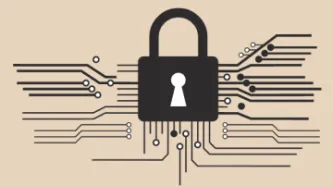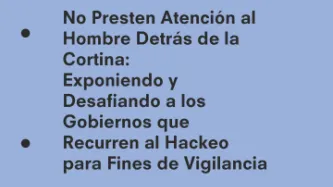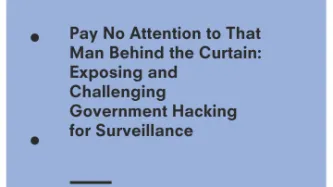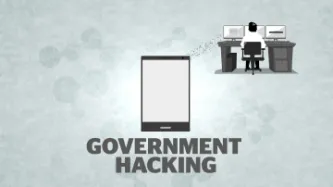Advanced Search
Content Type: Long Read
Sitting on the ground inside an unadorned courtyard in Koira Tegui, one of Niamey’s most popular districts, Halimatou Hamadou shows a copy of what, she’s been told, is a certificate of birth.
The 33 year old woman, who’s unable to read and write, received it days earlier during a crowded public ceremony at a nearby primary school.
“It’s my first document ever,'' she says, with surprise.
Thanks to the paper, she’ll be able to take part in a crucial passage for the future of Niger: the…
Content Type: Long Read
In this piece we examine mobile phone extraction, relying on publicly available information and Privacy International’s experience from conducting mobile phone extraction using a Cellebrite UFED Touch 2. We welcome input from experts in the field. This is a rapidly developing area. Just as new security features are announced for phones, so too new methods to extract data are found.
[All references can be found in the pdf version below.]
General explanation of mobile phone…
Content Type: News & Analysis
Photo by Daniel Jensen on Unsplash
Everyone is talking about Facebook's end-to-end encryption plans and the US, UK and Australian government's response. Feeling lost? Here is what you need to know.
What's Facebook trying to do?
First let's be clear: Facebook has many faults when it comes to privacy. It's also suffered a number of security failures recently. See here for instance.
In response to their successive failures to protect your privacy, Facebook announced in their 'pivot to privacy…
Content Type: News & Analysis
A new UK Times report claims that “WhatsApp, Facebook and other social media platforms will be forced to disclose encrypted messages from suspected terrorists, paedophiles and other serious criminals under a new treaty between the UK and the US.”
Several other media outlets have followed up on the report, with headlines such as “UK and US set to sign treaty allowing UK police ‘back door’ access to WhatsApp and other ‘end to end encrypted’ messaging platforms”.
While the…
Content Type: Impact Case Study
What HappenedOn 5 June 2013, The Guardian published the first in a series of documents disclosed by Edward Snowden, a whistleblower who had worked with the NSA. The documents revealed wide-ranging mass surveillance programs conducted by the USA’s National Security Agency (NSA) and the UK’s Government Communications Headquarters (GCHQ), which capture the communications and data of hundreds of millions of people around the world. In addition to revealing the mass surveillance programs of the NSA…
Content Type: Examples
In April 2018, the Austrian cabinet agreed on legislation that required asylum seekers would be forced to hand over their mobile devices to allow authorities to check their identities and origins. If they have been found to have entered another EU country first, under the Dublin regulation, they can be sent back there. The number of asylum seekers has dropped substantially since 2016, when measures were taken to close the Balkan route. The bill, which must pass Parliament, also allows the…
Content Type: Advocacy
Tanto la privacidad como la seguridad son esenciales para proteger a los individuos, su autonomía y su dignidad. El detrimento de la privacidad implica el detrimento de la seguridad de los individuos, sus dispositivos y la infraestructura de la que forman parte. La gente necesita privacidad para sentirse libremente segura y proteger su información, así como para gozar plenamente de otros derechos.
Una cantidad cada vez mayor de Gobiernos en el mundo está recurriendo también al hackeo para…
Content Type: Advocacy
Privacy and security are both essential to protecting individuals, including their autonomy and dignity. Undermining privacy undermines the security of individuals, their devices and the broader infrastructure. People need privacy to freely secure themselves, their information, and fully enjoy other rights.
A growing number of governments around the world are embracing hacking to facilitate their surveillance activities. When governments hack for surveillance purposes, they seek to…
Content Type: Advocacy
Introduction
Why We Are So Concerned about Government Hacking for Surveillance
Scope of Our Safeguards
1. Legality
2. Security and Integrity of Systems
3. Necessity and Proportionality
4. Judicial Authorisation
5. Integrity of information
6. Notification
7. Destruction and Return of Data
8. Oversight and Transparency
9. Extraterritoriality
10. Effective Remedy
Commentary on each
1. Legality
2. Security and Integrity of Systems
3. Necessity and Proportionality
4.…
Content Type: Examples
In a report on mobile security updates, the US Federal Trade Commission finds that because of the complexity of the mobile ecosystem applying security updates to operating system software on some mobile devices is time-consuming and complicated. Based on information gathered from eight device manufacturers - Apple, Blackberry, Google, HTC, LG, Microsoft, Motorola, and Samsung, the FTC recommends that manufacturers should deploy these updates more quickly and suggests that manufacturers should…
Content Type: Impact Case Study
What is the problem
Business models of lots of companies is based on data exploitation. Big Tech companies such Google, Amazon, Facebook; data brokers; online services; apps and many others collect, use and share huge amounts of data about us, frequently without our explicit consent of knowledge. Using implicit attributes of low-cost devices, their ‘free’ services or apps and other sources, they create unmatched tracking and targeting capabilities which are being used against us.
Why it is…
Content Type: Video
Content Type: Advocacy
On 20 March 2015, Privacy International and Open Rights Group submitted comments on the UK Government's draft Equipment Interference Code of Practice.
The UK has been hacking for over a decade, yet the release of the draft Code of Practice is the first time the UK intelligence services have sought public authorisation for their activities. Indeed, it is the first time the intelligence services have publicly acknowledged they engage in hacking.
Unfortunately, the draft Code of…












